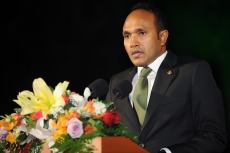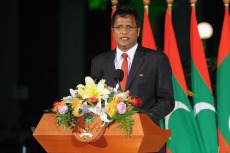Parliament on Tuesday (December 25) passed the bill on “Freedom of Peaceful Assembly” despite unanimous opposition from the Maldivian Democratic Party (MDP). The legislation was first submitted by independent MP Mohamed Nasheed on 5 April 2012.
The bill, which was initially called ‘Freedom of Assembly Bill’ was passed on the parliament floor with 44 votes in favour, and 30 votes against.
Among the key features of the bill is the outlawing of demonstrations outside private residences and government buildings, limitations on media not accredited with the state and defining gatherings as a group with more than a single person.
One of the main stated objectives of the legislation is to try and minimize restrictions on peaceful gatherings, which it claims remain a fundamental right.
The legislation continues that any restrictions enforced by police or other state institutions on participants at a gathering must be proportionate actions as outlined under specific circumstances defined in the bill.
The bill also provides a definition for ‘Gathering’ in Article 7(a), stating it refers to more than one person, with the same objective, purposefully attending a public or private place temporarily and peacefully expressing their views there.
Article 9(a), meanwhile, defines ‘Peaceful’ in relation to a gathering as being one where the organizers have notified [authorities] that this is a gathering to achieve a peaceful purpose, and provided no acts of violence occur, nor are there any chants, writing or drawings encouraging violence used in the gathering. Additionally, in such a gathering, no acts violating any laws must be committed, nor encouraged. Nor should participants have any items on them which can potentially be used to commit acts of violence.
Section (b) of Article 9 rejects defining a gathering as ‘not peaceful’ on the basis of words or behaviour of certain participants during a protest that may be considered hateful or unacceptable by other persons.
Under the new bill, citizens are not allowed to hold gatherings within a certain distance of the headquarters of police and the Maldives National Defence Force (MNDF).
Demonstrations would also be outlawed within a certain distance of the residences of the president and the vice president, the offices of the Maldives Monetary Authority (MMA), tourist resorts, harbours utilized for economic purposes, airports, the President’s Office, the courts of law, the Parliament, mosques, schools, hospitals and buildings housing diplomatic missions.
The bill also states that demonstrators wishing to protest against a specific individual, may not use megaphones, stand outside, or have a sit-down outside that person’s residence.
The regulation also states that although demonstrators do not need to seek authorization ahead of a gathering, police must be then notified of any pre-planned demonstrations before they commence.
Among the actions prohibited under the bill include an article stating that participants in a demonstration are not to have on them swords, knives, other sharp objects, wood, metal rods, batons, bleach, petrol, kerosene, any form of chilli (including dried or powdered), acid, explosives, any other items that can potentially be used as a weapon or any gear used by police for riot-controlling and peacekeeping.
Article 21 stipulates that participants will also not be allowed to cover their faces with masks, balaclavas or any other material which would prevent them from being identifiable.
The bill does guarantee organizers and participants of a gathering the right to decide where to hold a demonstration as well as choosing its objectives and the persons who are given the opportunity to speak during the protest.
The bill will not be applicable to activities, gatherings or meetings organized by state institutions, or those organized under any other law and to sports, games, business or cultural events.
According to the bill, if participants in a gathering have to face material or physical loss due to the negligence of police who must provide protection, then the police institution must provide compensation. It further adds that in such instances, the affected individual cannot be penalized for having taken part in the gathering.
The regulations also impose restrictions on police officers, preventing them from partaking in activities such as joining a gathering, displaying agreement or disagreement to messages or themes of a protest and ordering where or when to hold demonstrations. Police officers are also prohibited from intervening in a gathering unless they are in uniform and states officers must not cover their faces unless as part of their riot gear under the bill.
Right to assemble
The bill also states that the right to assemble can be narrowed in the instances of a perceived threat to national security, or in order to maintain public safety as well as to establish societal peace in accordance with existing laws, to protect public health, to maintain levels of public discipline or to protect the rights and freedoms guaranteed to other individuals.
With regard to the media’s right to cover demonstrations, the bill adds that the Maldives Broadcasting Commission (MBC) must draft a regulation on accrediting journalists within three months of the ratification of the Bill on Freedom of Peaceful Assembly. It is only those journalists who are accredited by the MBC who will be granted access to cover and report on gatherings and police activities in the vicinity.
If an accredited journalist is believed to partaking in the gathering’s activities, treating these journalists as equal to those assembled is left at the discretion of the police. The bill, however, does not define what could be considered such an act.
The Maldives Media Council and the Maldives Journalists Association have expressed concern over these stipulations on Wednesday.
The limitations defined in the bill will bring positive changes: Home Minister
Minister of Home Affairs Mohamed Jameel Ahmed has stated that the Freedom of Peaceful Assembly Bill would bring positive changes to the country’s political environment and that it would provide guidance to politicians.
“It’s been established today that every right comes with accompanying responsibilities. I believe even the constitution reflects these principles. However, these principles need to be broken down into a law that would bring convenience to the people. Some among us thought when the constitution came that these are limitless freedoms that we’ve got. These past days we have seen people acting under that belief,” Jameel was quoted as telling the Sun Online news service.
“Under the name of this freedom, they were violating the personal and individual rights and protections of citizens. They were going at people’s residences, gathering outside and yelling vulgarities at parents and families, depriving children and families of sleep. All under the excuse of freedom of assembly.”
The Home Minister said that this bill would bring necessary limits at a time when many undesirable activities were being carried out under the guise of freedoms. He noted that the freedom of assembly was granted within limits in all other developed countries.
Not an ideal time to tamper with fundamental rights: MDP
Responding to the claims, MDP Spokesperson Hamid Abdul Ghafoor expressed concern that the fundamental right to assemble was being limited through the bill at “a time like this.”
“It is not wise to tamper with constitutionally provided fundamental rights at a time like this, when we are in times of a coup. But even that can be understood only by persons who can at first understand democratic principles, of course,” Ghafoor said.
“We need time for the Maldivian psyche to be able to grasp the concepts of fundamental rights first.”
“Home Minister Jameel is a prescriptive, Salafiyya-educated, uncivilized man. He has never yet been able to partake in and win any elected posts, his statements hold no weight in the eyes of the people. He is a man who obviously does not even understand this very basic, fundamental concept,” Hamid said in response to Jameel’s statements in media about the freedom of assembly bill.
Maldivian Democracy Network (MDN), which is cited in the parliamentary committee report as an entity that provided written feedback on the bill was unable to comment on the bill at the time of press.
MDN said that the NGO had today received the final bill which had been passed by the parliament, and that they were currently reviewing it to establish how much of their recommendations had been featured in the final bill.
Minivan News tried to contact MP Mohamed Nasheed, who was not responding to calls at the time of press.
Chair of the committee MP Riyaz Rasheed and Vice Chair MP Ahmed Amir were also not responding to calls this evening.
Human Rights Commission of the Maldives (HRCM) Vice President Ahmed Tholal’s phone was switched off at the time of press.
Likes (0)Dislikes
(0)Dislikes (0)
(0)
 (0)Dislikes
(0)Dislikes (0)
(0) National Pride
National Pride